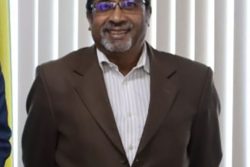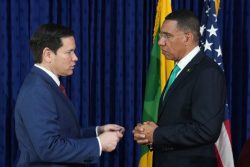 That some very poor and costly decisions in Guyana’s budding oil and gas sector have recently been visited upon Guyanese is now sufficiently established. We expect political decisions in competitive democratic societies to be marginally suboptimal: although usually done in the country’s name, they usually reflect the interests of some class, region or group. However, I am talking here of instances where politics are at a minimum, even the corrupt should be able to make better decisions and where largely well-meaning people continue to make very poor decisions/non-decisions.
That some very poor and costly decisions in Guyana’s budding oil and gas sector have recently been visited upon Guyanese is now sufficiently established. We expect political decisions in competitive democratic societies to be marginally suboptimal: although usually done in the country’s name, they usually reflect the interests of some class, region or group. However, I am talking here of instances where politics are at a minimum, even the corrupt should be able to make better decisions and where largely well-meaning people continue to make very poor decisions/non-decisions.
The government process is replete with questionable decisions, of which the controversial production sharing agreement with ExxonMobil is a signal example. But apart from this important issue, poor and costly decision-making has again raised its head in the discourse relating to the auditing of the ExxonMobil pre-contract costs and other matters. Indeed, Dr. Jan Mangal, an expert in the oil and gas industry, has claimed that the Ministry of Natural Resources (MNR) has not yet reviewed the US$4.4 billion capital cost for the Liza Phase 1 project. ‘If one assumes the capital cost for the Liza Phase 1 project could be reduced by 20%, which is not unreasonable, then the MNR effectively gave ExxonMobil US$880 million of Guyana’s money for no reason. That is more than four Skeldons’ (the US$200m East Berbice sugar factory usually portrayed as a white elephant of the previous PPP/C government) (SN: 12/09/2018).’
It is, therefore, incumbent upon one to attempt to account for these deficiencies in decision-making generally and more specifically in the fossil fuel sector. Using 360 feedbacks from more than 50,000 leaders and comparing the behaviour of those who made poor decisions and very good ones, in one Harvard study ‘nine factors emerged as the most common paths to poor decision making.’ In order of priority they are: laziness; not anticipating unexpected events; indecisiveness; remaining locked in the past; having no strategic alignment; over-dependence; isolation; lack of technical depth and failure to communicate the what, where, when, and how associated with their decisions (https://hbr.org/2014/09/9-habits-that-lead-to-terrible-decisions).
Briefly, laziness is the failure to take the initiative to properly check facts and confirm assumptions. ‘Basically, such people were perceived to be sloppy in their work and unwilling to put themselves out.’ Secondly, there is excellent research demonstrating that if people just take the time to do the due-diligence, they are actually very good at anticipating problems. Thirdly, complexity makes some people indecisive and ‘Oftentimes indecision is worse than making the wrong decision.’ Fourthly, those who are locked in the past make poor decisions because they’re using the same old processes even data they always have. ‘Better the devil they know.’
Fifthly, many bad decisions result from not having a strategic alignment and thus being unable to connect the problem to the overall strategy. ‘In the absence of a clear strategy that provides context, many solutions appear to make sense. When tightly linked to a clear strategy, the better solutions quickly begin to rise to the top.’ Sixthly, over-dependence is where decisions are not made because one person is waiting for another’s, who in turn is waiting for someone else’s. ‘Effective decision makers find a way to act independently when necessary.’ Seventhly, some leaders are isolated and unable take the necessary steps to get information. ‘All our research … on effective decision making recognizes that involving others with the relevant knowledge, experience, and expertise improves the quality of the decision.’
Eighthly, today, organisations are very complex, and even the best leaders do not have enough technical depth to fully understand all the issues. ‘But when decision makers rely on others’ knowledge and expertise without any perspective of their own, they have a difficult time integrating that information to make effective decisions. And when they lack even basic knowledge and expertise, they have no way to tell if a decision is brilliant or terrible. … We continue to find that the best executives have deep expertise.’ Finally, there may be failure to communicate the what, where, when, and how associated with decisions. ‘Some good decisions become bad decisions because people don’t understand – or even know about — them. Communicating a decision, its rational and implications is critical to the successful implementation of a decision.’
All of the above factors are discernible in Guyana’s administrative context, but in my opinion, the absence of a strategic vision, lack of technical depth and the reluctance to communicate are palpably contributing to the maladministration of the embryonic oil and gas sector. Three years since the discovery of oil, the government has not been able to devise and sell to the populace a vision that will help it to properly locate and understand the administration’s specific acts. But it is the absence of an appreciation of the nature and vicissitudes of technical depth that is obvious and self-reinforcing. While there is awareness that technical knowledge is important, there is not a deep understanding of what this entails.
For example, the president and his cabinet have selected those persons who, because of their lack of expertise, negotiated the disastrous production sharing agreement, and they have also agreed with the outcome. Under public pressure, the regime was forced to announce that it intends to establish a Department of Energy, but then without much consultation, the president has proceeded to appoint as head of this department someone with zero experience in the oil and gas sector and has tried to explained to a surprised public that he, also with zero knowledge and a bad previous practice to wit, has assessed that the appointee has sufficient expertise to ask deep professionals the right questions!
A similar kind of attitude underlies the questioning of whether the Guyana Revenue Authority could ‘properly, legally and meaningfully’ conduct the audit of ExxonMobil’s pre-contract costs. The commissioner-general of the GRA, Mr. Godfrey Statia, has stated that responsibility for auditing the oil companies rests with a minister of government who could delegate that authority to the GRA and that he is ‘confident in the ability of the GRA to undertake this task and get this job done’ (SN: 07/09/2018). A few days later, Dr. Jan Mangal questioned this: ‘The GRA does not have the capacity to review or even the capacity to oversee the review of contract costs. Furthermore, the GRA should never try to develop the capacity to play such a high-level role’ (SN: 12/09/20180). Then, Auditor General, Mr. Deodat Sharma, has disassociated his organisation from any notion of readiness: ‘To say that we were are prepared, I cannot right now because my office is now preparing to understand even some of the terminology!’ The commissioner-general is finally thrown under the bus by the head of the newly formed Department of Energy, Dr Mark Bynoe, who has informed us that ‘an international firm will be hired to aid both the Guyana Revenue Authority (GRA) and the state audit office to discharge their obligations.’
Anyone with a reasonable grasp of the process of learning must know that properly comprehending the outcome of the dialectics between concept and experience in such a complicated field will most likely take years. But this under-appreciation of the nature and necessity for deep technical knowledge is dangerously pervasive, and the external operators in the oil and gas sector are too well qualified, prepared and rapacious for the government to be winging it!








